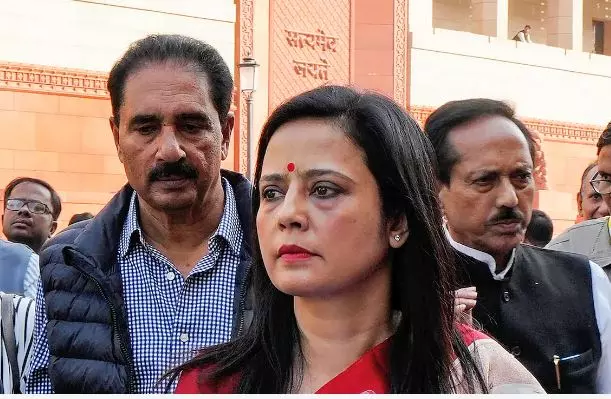
What options are left for Mahua to fight expulsion from Parliament?
text_fieldsIn a stunning turn of events, Trinamool Congress MP Mahua Moitra has been expelled from the Lok Sabha following the adoption of the Ethics Committee's report, which found her guilty of "unethical conduct" and "serious misdemeanours."
The move has sparked a political firestorm, with Moitra's party staunchly supporting her and vowing to fight the issue through political means.
While the party gears up for a political battle, legal experts are weighing in on the potential legal avenues Moitra can explore. The possibility of approaching the Supreme Court looms large, but constitutional constraints present a complex scenario.
The Indian Express reported, quoting former Lok Sabha secretary general P D T Achary, who shed light on the legal intricacies. He pointed to Article 122 of the Constitution, which provides immunity to parliamentary proceedings from court challenges based on procedural irregularities.
However, the 2007 Raja Ram Pal case set a precedent that opened a window for judicial review. In that case, a Constitution Bench of the Supreme Court dismissed petitions filed by 12 expelled MPs, including Raja Ram Pal, involved in the 2005 cash-for-query scam.
The court, while upholding the expulsion, emphasized that proceedings tainted by substantive illegality or unconstitutionality could be subject to judicial scrutiny.
Achary underscores in the TIE report the relevance of Article 105, which delineates the powers and privileges of Parliament and its members. He notes that while the court cannot question the truth or correctness of the material relied upon by the legislature, it can scrutinize the manner of enforcing privilege by the legislature, subject to constitutional restrictions.
The grounds for a legal challenge are not straightforward. Achary explains that while a House possesses the power to expel a member for breaching privilege, the court can assess whether the alleged privilege existed at the time.
This involves scrutinizing the procedures followed by committees investigating misconduct, such as the Privileges Committee and Ethics Committee. These committees, according to Achary, must adhere to a distinct set of procedures tailored to the sensitive nature of their investigative work.
Moitra, in her defence, has raised concerns about being denied natural justice, citing the inability to cross-examine individuals central to the allegations against her. The former Lok Sabha secretary general highlights the importance of a fair and thorough investigation, emphasizing the need for proper procedures.
Achary also addresses the challenge of determining an offence, pointing to Article 20 of the Constitution. He argues that a person cannot be punished unless an offence is committed according to the law existing at the time. In Moitra's case, the absence of a specific rule or law regarding the alleged sharing of a Parliament login password raises questions about the validity of the charges.
As the Trinamool Congress rallies behind its expelled MP, the intricate interplay between constitutional provisions, legal precedents, and the specifics of Moitra's case adds a layer of complexity to the unfolding drama in the Indian political landscape.






















